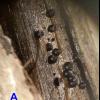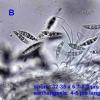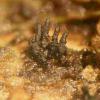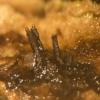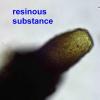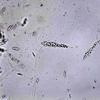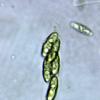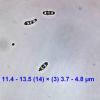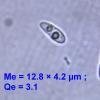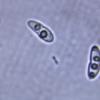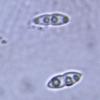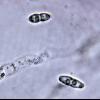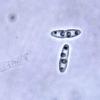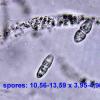
09-11-2025 13:20
Hello.A tiny ascomycete, appearing as erupting gra

08-11-2025 00:29
 Francois Guay
Francois Guay
I found this species in Quebec, Canada, on herbace

04-11-2025 09:07
Hello.A suspected Hymenoscyphus sprouting on a thi

04-11-2025 12:43
 Edvin Johannesen
Edvin Johannesen
Hi! One more found on old Populus tremula log in O

03-11-2025 21:34
 Edvin Johannesen
Edvin Johannesen
These tiny (0.4-0.5 mm diam.), whitish, short-stip
On 19 March 2021 I took some thin twigs of Ulex europaeus home for examination.
I found several perithecia of Lophiosphaera ulicis (Photo A and B). Nearby I found perithecia with long necks (1.3 mm long; 0.13 mm wide at the base).
After a few days, a resinous substance flowed from the ostiole. It was too hard to examine microscopically.
In the lower part of the perithecia I found asci with ellipsoid spores. They had 1 sept (slightly off centre) and are constricted there.
Who can help me, could this be Diaporthe or Chrysoporthe?
Many thanks in advance,
François Bartholomeeusen

These long-stalked asci and there apex are typical for Diatrypaceae. There, with those very long neck, I would directly have chosen for Peroneutypa. But Peroneutypa species have small, aseptate spores. At first sight no other genus seems to fit here.
All the best,
Bernard
Bonjour,
Espèce à comparer à Diaporthe eres. Ou en tout cas dans ce genre. Il arrive que les becs soient si longs.
Alain
Good afternoon Alain,
Thank you for your suggestion. Diaporthe eres is a good candidate. I found a description of D. eres on the internet (Huhndorf, S.A. 1992 and Wehmeyer L.E. 1933).
The dimensions of the spores are correct except mine are wider (possible effect of measurements on herbarium material?).
In attachment some pictures of the last examinations. I have the impression that the spores take on a different shape with each examination.
Because the two parts of the spores are not always the same I thought of Apioporthe but that seems to be a synonym of Diaporthe. Sometimes I think I see short appendages at the poles of the spores.
My choice is D. eres if the substrate is not a problem.
Thank you very much Alain and Bernard,
François Bartholomeeusen

Spores typical Diaporthe indeed. But the young long-stalked ascus on the left on that misleading photo 6, on which my comments were based, certainly does not belong to Diaporthe.
Bernard

